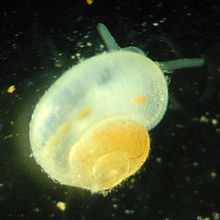Stygofauna

Stygofauna are any fauna that live in groundwater systems or aquifers, such as some caves, fissures and vugs. Stygofauna and troglofauna are the two types of subterranean fauna (based on life-history). Both are associated with subterranean environments – stygofauna are associated with water and troglofauna with caves and spaces above the water table. Stygofauna can live within freshwater aquifers and within the pore spaces of limestone, calcrete or laterite, whilst larger animals can be found in cave waters and wells. Stygofaunal animals, like troglofauna, are divided into three groups based on their life history - stygophiles, stygoxenes and stygobites.
- Stygophiles inhabit both surface and subterranean aquatic environments, but are not necessarily restricted to either;
- Stygoxenes are like stygophiles, except they are defined as accidental or occasional presence in subterranean waters. Stygophiles and stygoxenes may live for part of their lives in caves but do not complete their life cycle in them; and
- Stygobites are obligate or strictly subterranean, aquatic animals and complete their entire life in this environment.[1]
Extensive research has been done into the stygofauna of numerous other European countries (namely France and Slovenia), the USA and more recently in Australia, due to easy accessibility of caves and wells in these regions, as well as the high diversity and numbers of animals present here. Many species of stygofauna, especially obligate stygofauna (stygobites), are endemic to particular regions or even particular caves. This makes them focal points for conservation of groundwater systems.
Diet and lifecycle

Stygofauna have adapted to the limited food supply and are extremely energy efficient. Stygofauna feed on plankton, bacteria and plants found in streams.[2]
.jpg)
To survive in an environment where food is scarce and oxygen levels are low, stygofauna often have very low metabolism. As a result, stygofauna may live longer than other terrestrial species. For example, the crayfish Orconectes australis of Shelta Cave in Alabama can reproduce at 100 years and live to 175.[3]

Distribution and species
Stygofauna are found all over the world, and include turbellarians, gastropods, isopods, amphipods, decapods, fishes and salamanders.
Stygofaunal gastropods are found in the U.S, Europe and Japan.[4] and Australia. Stygobite turbellarians can be found in the United States, Europe and Japan.[4] Stygobite isopods, amphipods and decapods are found widely around the world.
Cave salamanders are found in Europe and the U.S, but only some of these (such as the olm and Texas blind salamander) are entirely aquatic.
The approximately 170 species of stygobite fish are found in all continents, except Antarctica.[5][6] Among these are members from a wide range of fish families, including Amblyopsidae (U.S. cavefishes), Astroblepidae (naked sucker-mouth catfishes), Balitoridae (hillstream loaches), Bythitidae (brotulas), Characidae (characids), Clariidae (airbreathing catfishes), Cyprinidae (carps and allies), Cyprinodontidae (pupfishes), Eleotridae (sleeper gobies), Gobiidae (gobies), Heptapteridae (heptapterid catfishes), Ictaluridae (ictalurid catfishes), Loricariidae (loricariid catfishes), Nemacheilidae (stone loaches), Sternopygidae (glass knifefishes), Synbranchidae (swamp eels) and Trichomycteridae (pencil catfishes).[6]
Collecting stygofauna
Several methods are currently used to sample stygofauna. The accepted method is to lower a haul net, which is a weighted plankton 'net' (with minimum 50µm mesh size), to the bottom of the bore, well or sinkhole and jiggled to agitate sediments at the base of the bore. The net is then slowly retrieved, filtering stygofauna out of the water column on the upward haul.[7] A more destructive method is to pump bore water (using a Bou-Rouch pump) through a net on the surface (referred to as the Karaman-Chappuis method).[7][8] These two methods provide animals for morphological and molecular analyses. A video camera can also be used down the hole, providing information on life-history of the organisms but, given the small size of the animals no species determinations can be made.
See also
References
- ↑ Rubens M. Lopes, Janet Warner Reid, Carlos Eduardo Falavigna Da Rocha (1999). "Copepoda: developments in ecology, biology and systematics: proceedings of the Seventh international conference on Copepoda, held in Curitiba". Hydrobiologia. 453/454. Springer. p. 576.
- ↑ Thomas C. Barr, Jr. (1967). "Observations on the ecology of caves". The American Naturalist 101 (922): 475–491. doi:10.1086/282512. JSTOR 2459274.
- ↑ Kevin Krajick (September 2007). "Discoveries in the dark". National Geographic.
- ↑ 4.0 4.1 Thomas C. Barr, Jr. & John R. Holsinger (1985). "Speciation in cave faunas". Annual Review of Ecology and Systematics 16: 313–337. doi:10.1146/annurev.es.16.110185.001525. JSTOR 2097051.
- ↑ Rantin B., and M.E. Bichuette (2013). Phototactic behaviour of subterranean Copionodontinae Pinna, 1992 catfishes (Siluriformes, Trichomycteridae) from Chapada Diamantina, central Bahia, northeastern Brazil. International Journal of Speleology 41(1): 57-63
- ↑ 6.0 6.1 Romero, A., editor (2001). The Biology of Hypogean Fishes. Developments in Environmental Biology of Fishes. ISBN 978-1402000768
- ↑ 7.0 7.1 Environmental Protection Authority of Western Australia (2007). "Sampling methods and survey considerations for subterranean fauna in Western Australia (Technical Appendix to Guidance Statement No. 54)". p. 32.
- ↑ F. Malard, ed. (2002). "Sampling Manual for the Assessment of Regional Groundwater Diversity". p. 74.